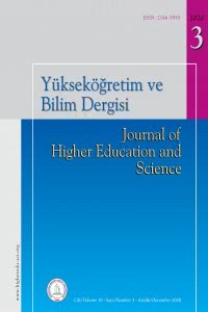Lise Öğretmenleri Kişilik Özelliklerinin Öğretmen Yeterliliklerine Etkisi
Bu araştırmada liselerde görev yapan öğretmenlerin kişilik özelliklerinin öğretmen yeterlikleri üzerindeki etkileri incelenmiştir. Tarama modeline uygun olarak düzenlenen araştırma 2010-2011 öğretim yılı bahar dönemi ile sınırlıdır. Araştırmanın örneklemini 428 lise öğretmeni oluşturmaktadır. Veri toplama araçları olarak ‘Sıfatlara Dayalı Kişilik Testi’ ile ‘Öğretmen Yeterlilik Algısı Ölçeği’ kullanılmıştır. Verilerin analizi için yapısal eşitlik modellemesi yöntemi kullanılarak yol analizi “path analysis” yapılmıştır. Analiz sonucunda deneyime açıklık kişilik boyutunun öğretmen yeterliğini yordayan en güçlü yordayıcı, öğretmen yeterliliklerinden ise kendini geliştirmenin de en fazla etkilenen boyut olduğu görülmüştür
Anahtar Kelimeler:
Kişilik, Öğretmen yeterliği, Beş-faktör kişilik modeli
The Infl uence of Personality Traits of High School Teachers on Their Teacher Qualifications
Th e eff ects of the personality traits on the teacher qualifications of the teachers working of the high schools were analysed in this study. Th is study was a local survey research at 2010-2011 of the summer semester. Th e sample of the study consisted of 428 teachers. Personality test based on adjectives, and perceptions of compedence scale were used as data collection tools. “Path analysis” method was done for data analysis by structural equation modelling procedure. Analysis revealed that the openness for the experience, one of the personality traits, was found to be the most infl uential predictor of the teacher qualifications, also self-development, one of the teacher qualifications, was found to be most infl uenced dimension from the personality traits
___
- Bacanlı, H., İlhan, T., & Aslan, S. (2009). Beş faktör kuramına dayalı bir kişilik ölçeğinin geliş rilmesi: Sıfatlara Dayalı Kişilik Tes (SDKT). Türk Eği m Bilimleri Dergisi, 7(2), 261-279.
- Bentler, P.M. & Bonnet, D.G. (1980). Signifi cance tests and goodness of fi t in the analysis of covariance structures. Psychological Bulle n, 88, 588-606.
- Blair, M., Jones, R.S., & Simpson, H. (1975). Educa onal Psychology. New York: Macmillan Publishing Company.
- Browne, M.W. & Cudeck, R. (1992). Alterna ve ways of assessing model fi t. Sociological Methods Research 21(2), 230-258.
- Büyüköztürk, Ş., Kılıç Çakmak, E., Akgün, Ö.E., Karadeniz, Ş., & Demirel, F. (2010). Bilimsel Araş rma Yöntemleri. Ankara: Pegem A Yayıncılık.
- Callahan, S.G. (1966). Successful Teaching in Secondary Schools. Sco : Glenview.
- Cohen, J. (1988). Sta s cal Power Analysis for the Behavioral Sciences (2nd ed.). Lawrence Erlbaum Associates.
- Erdoğan, İ. (2001). Sınıf yöne mi. İstanbul: Sistem Yayıncılık.
- Hotaman, D. (2011). Eği m fakülteleri kendi öğrencilerini seçebilir mi? Kuramsal Eği mbilim, 4(1), 126-136.
- Hu, L. & Bentler, P.M. (1999). Cut off criteria for fi t indexes in covariance structure analysis: conven onal criteria versus new alterna ves. Structural Equa on Modeling, 6, 1-55.
- Jones, J. (1989). Students’ ra ngs of teacher personality and teacher competence. Higher Educa on, 18, 551- 558.
- Joreskog, K.G. & Sorbom, D. (1993). LISREL 8 user’s guide. Chicago: Scien fi c So ware Interna onal.
- Karacaoğlu, Ö.C. (2008). Avrupa birliği uyum sürecinde öğretmen yeterlilikleri. Yayımlanmamış Doktora Tezi, Ankara Üniversitesi, Eği m Bilimleri Ens tüsü.
- Karasar, N. (1999). Bilimsel araş rma yöntemi: Kavramlar, ilkeler, teknikler. Ankara: Nobel Yayın Dağı m.
- ISSN: 2146-5959
- Yayın Aralığı: Yılda 3 Sayı
- Başlangıç: 2011
- Yayıncı: Bülent Ecevit Üniversitesi (Önceden Zonguldak Karaelmas Üniversitesi)
Sayıdaki Diğer Makaleler
Lisansüstü Eğitimde Normlar: Yapı, İklim ve Danışmanlık
MUNİSE SEÇKİN KAPUCU, Çiğdem APAYDIN, AHMET AYPAY
Lise Öğretmenleri Kişilik Özelliklerinin Öğretmen Yeterliliklerine Etkisi
Teorik Kurgusu ve Paradigmatik Yönelimi Açısından Yükseköğretim Yasa Tasarısı
Fizyoterapi ve Rehabilitasyon Bölümü Öğrencilerinde Mesleki Farkındalığın Değerlendirilmesi
Zuhal KUNDURACILAR, EDA AKBAŞ, MUSTAFA ÇAĞATAY BÜYÜKUYSAL, Demet BIÇKI, EMİN ULAŞ ERDEM
Bilim İnsanı Yetiştirmede Araştırma Eğitimi
Türkiye’de Üniversitelerin Kalitesini Belirlemek İçin Bir Yaklaşım
Bologna Süreci: Uygulama veya Uygulayamama
Üniversitelerimizde Fen Bilimleri Bölümlerinin Yeni Görüntüsü
